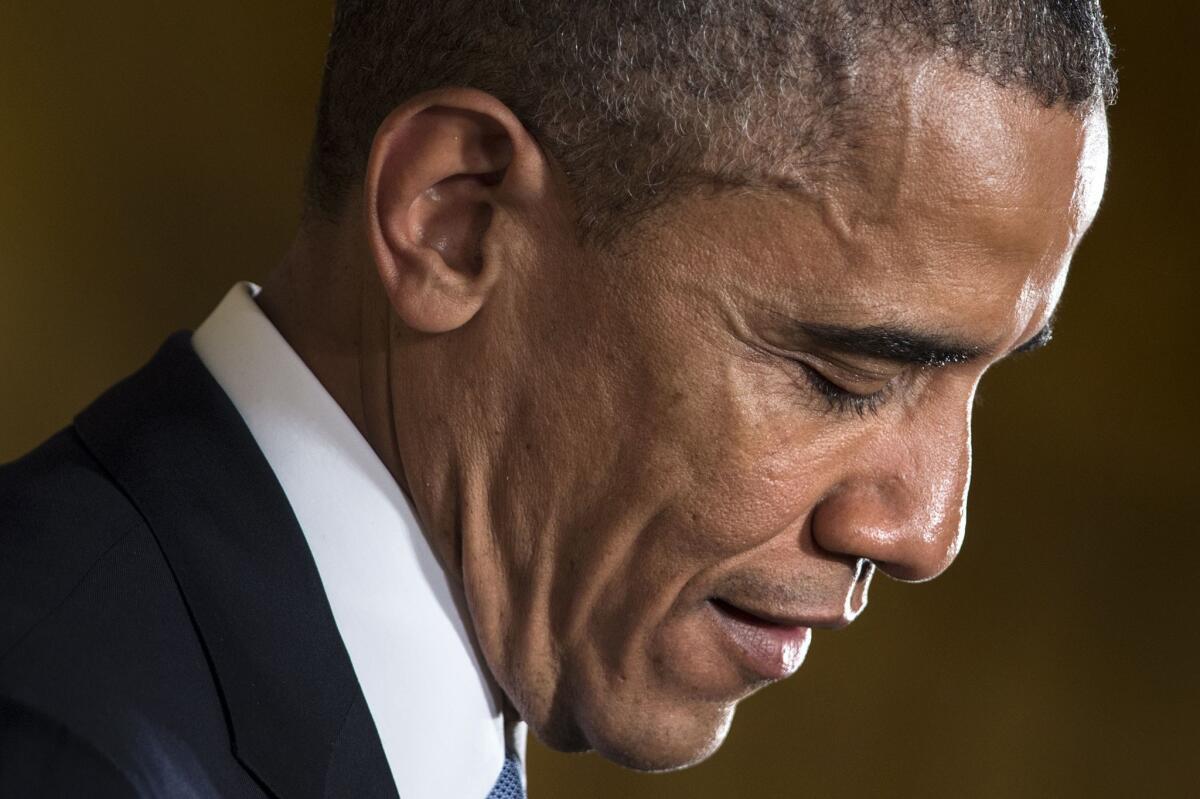Column: Can Obama’s presidency be saved?

Even before the drubbing his party suffered in last week’s congressional election, President Obama was visibly frustrated by Republicans’ tenacious opposition to his second-term agenda. Now he’s heading into the final years of his presidency facing a Congress that will be even harder to deal with. Does this mean Obama’s last lap is destined to be a hopeless, unrewarding slog?
Not necessarily. Ronald Reagan and Bill Clinton both spent their final two years in office with Congress in the hands of the opposition, and they’re now the most revered presidents of the last half-century.
By at least one measure, Reagan and Clinton had it worse than Obama when they rounded the six-year mark. Reagan was mired in the Iran-Contra scandal, which drove his popularity as low as 43%, about where Obama’s is now. Clinton was getting himself impeached.
No two presidencies are exactly alike, of course; the chief executives are different, as are the challenges they face. Still, there may be some lessons for Obama in his predecessors’ strategies.
Here are four things Obama could do that build on lessons from the Reagan and Clinton turnarounds:
Keep telling voters he has heard their message about getting something done. Reagan recovered from Iran-Contra once he admitted, however grudgingly, that his policy had turned into a trade of arms for hostages. Clinton regained credibility only after he apologized repeatedly for lying about his affair with Monica Lewinsky. Obama doesn’t have a scandal to apologize for. But he does need to sound as if he’s absorbed a message — and it can’t be simply “We should have turned out more voters,” which is pretty much what he said last week.
Hire some new aides and expand his insular circle of advisors. It’s a near-universal complaint from members of Congress — Democrats as well as Republicans — that Obama rarely asks their advice or pays heed to their problems. A little more listening and a more receptive staff could go a long way.
Obama already has one very good end-of-term counselor in John Podesta, Clinton’s last chief of staff, but Podesta reportedly wants to leave next year to run Hillary Rodham Clinton’s presidential campaign. Obama should do everything he can to keep him, or at least make sure he gets every last shred of advice Podesta has to offer for his last two years.
Pursue bipartisan deals, even though they may seem modest and require painful compromises. Obama’s aides have already been working on a list of these, including corporate tax reform and international trade agreements.
It’s unrealistic to try for any kind of “grand bargain.” Reagan’s biggest domestic achievement in his last two years was a now-forgotten transportation bill; Clinton’s was leaving his successor a budget surplus that soon got spent.
Meanwhile, Obama can still force changes through executive orders, as he has long promised his supporters he will do on immigration reform and environmental regulation. The trick will be to manage those moments of confrontation so they don’t poison the well for the rest of the agenda, as GOP leaders have warned they could. Obama can do that by trimming the scope of his orders, minimizing partisan rhetoric when they’re announced — and, most important, making sure Republicans have a stake in keeping the rest of the bipartisan agenda, however skinny, alive.
Focus on foreign policy, something Congress can’t take away from him. Reagan is remembered chiefly for opening the way to the end of the Cold War, thanks to a turn toward negotiation with the Soviet Union. In Clinton’s last two years, he prosecuted a successful war in Kosovo, and although his last-minute drive for Middle East peace was unsuccessful, he left the world in reasonably good shape.
Obama’s end-of-tenure foreign policy priorities are already apparent. He’s likely to leave his successor an unfinished war in Iraq and Syria against the militant group Islamic State, but merely keeping that campaign on track will be an achievement. If things break the president’s way, he’ll also have a landmark nuclear deal with Iran, which will require energy and skill to steer past determined opponents in Congress.
Even if Obama successfully hits all those marks, there’s one more factor that could make or break his legacy: the economy. One big reason Reagan and Clinton are remembered so fondly is that the economy was healthy when they left the White House. The unemployment rate was 5.5% in Reagan’s last year in office, 4.0% in Clinton’s. By the end of Obama’s presidency, the Federal Reserve projects, unemployment will have fallen from the current 5.8% to somewhere near 5.0% — a Reaganesque if not Clintonian rate.
If that keeps up, Barack Obama just might leave the White House in January 2017 in a glow of success — remembered fondly by many of his countrymen (not all, of course) as the president who ended the Great Recession, brought two wars to a close and made health insurance available to millions.
Sound unlikely? Maybe. But a positive legacy sounded unlikely in 1986 and 1998 too.
Twitter: @DoyleMcManus
More to Read
Sign up for Essential California
The most important California stories and recommendations in your inbox every morning.
You may occasionally receive promotional content from the Los Angeles Times.










